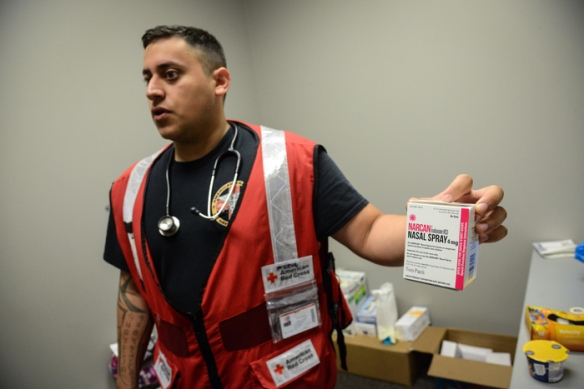New online training helps people respond to opioid overdoses and save lives
The American Red Cross has launched First Aid for Opioid Overdoses – an online course to teach people how to respond to a known or suspected opioid overdose.
The 45 minute course contains content on how to identify the signs and symptoms of a suspected opioid overdose and the appropriate care to provide based on the responsiveness of the person. Information on how to use several different naloxone products – including a nasal atomizer, Narcan Nasal Spray, and EVZIO – to temporarily reverse the effects of an opioid overdose is also included.
People can register and access the course at https://www.redcross.org/take-a-class/opioidoverdose. Because an opioid overdose can lead to cardiac arrest, people are also encouraged to take a Red Cross CPR/AED course.
“An opioid overdose is a life-threatening emergency,” said Mike Parks, Regional CEO of the Red Cross of Northeast Ohio. “When you suspect an opioid overdose, it’s important to start providing care immediately.”
Recently, the Red Cross had the opportunity to share its commitment and efforts to help address this public health crisis at a White House opioids event. Learn more about the event, and the involvement of the Red Cross here: https://www.whitehouse.gov/articles/year-historic-action-combat-opioid-crisis/
The Red Cross has also prepared guidance on opioid use and overdose response for those working in the organization’s shelters during disasters. Recently, these efforts empowered a Red Cross volunteer to help save the life of a person in a shelter during Hurricane Florence.

In addition to the new First Aid for Opioid Overdoses online course, this is the first year Red Cross disaster shelters are arming staff and volunteers with information and supplies to help ensure that everyone stays safe in the case of an opioid overdose. During Hurricane Florence, Julian Delgado with Health Services explains to volunteers how to administer these supplies for residents who may need them in shelters. Photo by Daniel Cima/American Red Cross.
“Residents staying at Red Cross shelters often reflect the demographics of the general population,” said Parks, who worked in shelters in North Carolina during the Hurricane Florence disaster relief operation. “Volunteer shelter workers who are trained to provide treatment when an overdose is suspected will no doubt save more lives in the future.”
